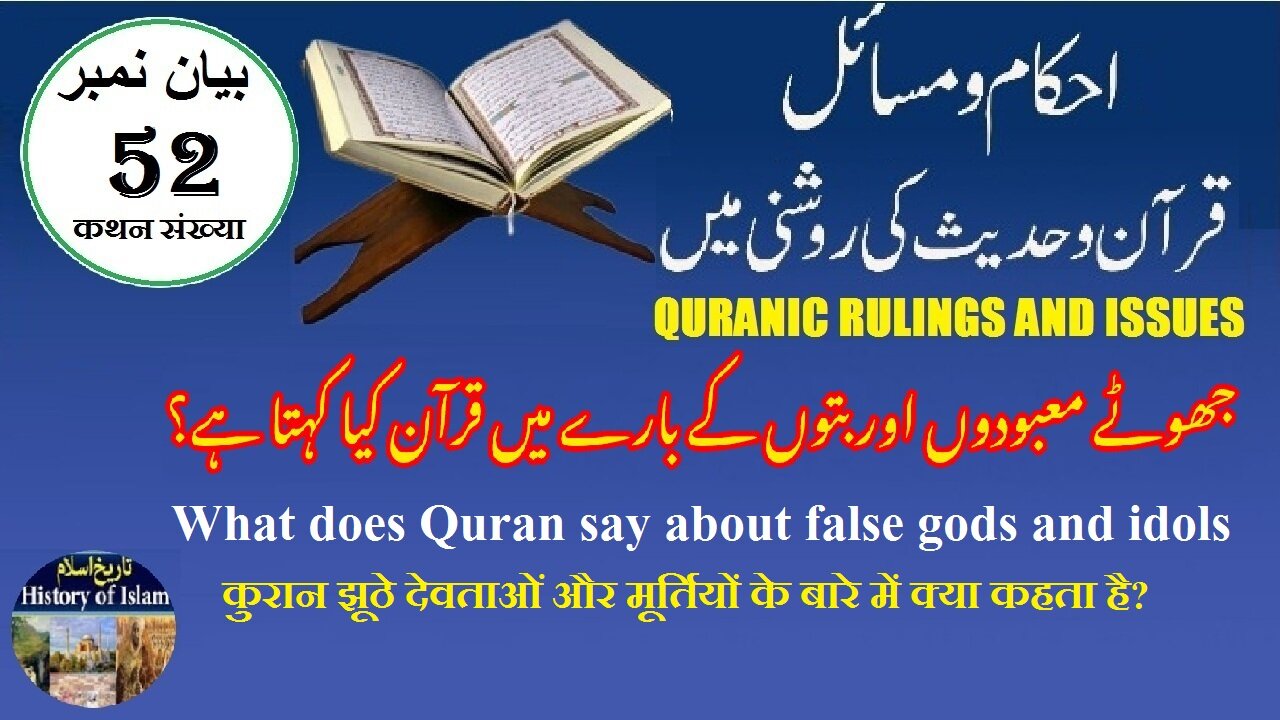Premium Only Content

What does Quran say about false gods & idols جھوٹے معبودوں اور بتوں کے بارے میں قرآن کیا کہتا ہے
@islamichistory813 #what #does #the #quran #say #about #false #gods #and #idols #islamicbayan #seriesofstatement #statement52 #bayan52
What does the Quran say about false gods and idols
Assalamu Alaikum sisters, brothers, friends and elders:
We welcome you to Statement Number 52 in our series of statements. We will explain in it that: (What does the Quran say about false gods and idols ), our aim is to learn and teach from the Quran and Sunnah, reflect on history and seek solutions to problems with divine guidance.
The Quran is a timeless book of guidance that repeatedly emphasizes the oneness of Allah and the futility of worshipping false gods and idols. From the very beginning, Allah made clear that He alone is the Creator and Sustainer of all creation, and none share in His dominion. The rejection of idolatry, known as shirk, is central to the message of the Quran, and it is presented as the greatest sin because it involves associating partners with Allah. The Quran not only exposes the weakness of idols but also illustrates the spiritual and moral corruption that arises from false worship.
The Quran highlights that idols are nothing more than lifeless objects created by human hands. Allah declares in Surah Al-Araf verse 191, Do they associate with Him those who create nothing, while they themselves are created. This verse underlines the absurdity of idol worship because idols lack the ability to create, sustain, or control anything. Unlike Allah, who is Al-Khaliq, the Creator, these objects possess no power or will of their own. Their supposed divinity is a false claim, and the Quran challenges the people to reflect on the irrationality of such practices.
The Quran also makes it clear that idols cannot benefit or harm those who worship them. In Surah Yunus verse 18, Allah says, They worship besides Allah that which neither harms them nor benefits them, and they say, These are our intercessors with Allah. The verse exposes the misguided belief of idol worshippers who imagine that these statues or false gods can serve as mediators. In reality, Allah is closer to His servants than their jugular vein, as mentioned in Surah Qaf verse 16, and no intercessor is accepted without His permission. Thus, seeking aid through idols is an illusion that only distances one from the mercy of Allah.
Idolatry is not only portrayed as a false belief but also as a cause of moral decline. The Quran explains that worshipping false gods blinds people to the truth and makes them stubborn in sin. In Surah Al-Ankabut verse 25, Allah narrates the words of Prophet Ibrahim, You have only taken idols besides Allah as a bond of affection among you in worldly life. Then on the Day of Resurrection, you will disown each other and curse each other, and your refuge will be the Fire. This verse warns that the apparent unity and strength people think they gain through idol worship will end in betrayal and regret in the Hereafter.
The Quran constantly recalls the stories of past nations destroyed due to their devotion to idols. The people of Nuh, Hud, Salih, and Lut all indulged in false worship, which ultimately brought the punishment of Allah upon them. In Surah Ash-Shuara verse 123, the people of Hud are described as having rejected the message, clinging to their idols and arrogance. Their downfall serves as a warning for future generations that idolatry not only leads to spiritual ruin but also worldly destruction.
Despite these warnings, the Quran does not close the doors of repentance. It offers hope to those who abandon false gods and turn sincerely to Allah. In Surah Az-Zumar verse 53, Allah says, Say, O My servants who have transgressed against themselves, do not despair of the mercy of Allah. Indeed, Allah forgives all sins. Indeed, it is He who is the Forgiving, the Merciful. This verse extends Allah’s mercy to even those who committed shirk if they repent before death. It reflects the generosity of Allah’s forgiveness and the opportunity for renewal through Tawheed, the belief in His oneness.
The Prophet Muhammad, peace be upon him, reinforced the Quranic teachings on idolatry through his words and actions. He declared in Sahih al-Bukhari Hadith number 7553, Whoever dies while still invoking anything other than Allah as a rival to Him will enter Hell. This Hadith makes it clear that shirk is the gravest of sins with eternal consequences. The Prophet also demonstrated this in practice when he purified the Kaaba of idols after the conquest of Makkah, restoring it as the House of Allah alone.
Another essential aspect the Quran points out is that idol worshippers will be disowned by their false gods on the Day of Judgment. Surah Al-Baqarah verse 166 states, When those who were followed disown those who followed them, and they see the punishment, and cut off from them are the ties. On that day, idols and false leaders will not only fail to help their worshippers but will turn against them, leaving them abandoned to face their punishment alone. This demonstrates the futility of trusting in powerless deities.
In conclusion, the Quran presents idol worship as an irrational and destructive practice that contradicts the truth of Allah’s oneness. It strips idols of any claim to power, exposes their inability to benefit or harm, and warns of the disastrous consequences of associating partners with Allah. Through powerful verses and prophetic guidance, believers are reminded that true worship belongs only to Allah, the One who creates, sustains, forgives, and judges. The Quran teaches that abandoning false gods and embracing sincere faith in Allah is the path to salvation, mercy, and eternal success. The story of idol worship and its condemnation is not merely historical but a timeless warning for all humanity to safeguard their faith and devotion solely to the Lord of the Worlds.
We conclude today's discussion with this humble supplication: O Allah, purify our hearts, accept our deeds, forgive our sins, and include us among Your grateful servants. Amen
Allah Hafiz
#qurantafseer #hadithlessons #ilmdeen #quranwisdom #rozanabayan #sunnahteachings #imanibaatain #islamicknowledge #masailkaahal #quranstories #deenreminder #hadithseikhtalat #islamicsolutions #ilmokhikmat #dailybayan #sunnatseekhain #islamicevents #deenikahaniyan #quranmessage #islamiclessons #islamiwaqiat #bayanseries #quranreminder #islamicwisdom
==================================
-
 12:06
12:06
ISLAMIC HISTORY
3 hours agoKhalid bin Walid (RA) Islamic Warrior Episode 94 خالد بن ولید رضی اللہ عنہ اسلامی جنگجو قسط نمبر
1 -
 4:19
4:19
PistonPop-TV
6 days agoThe 4E-FTE: Toyota’s Smallest Turbo Monster
36 -
 43:07
43:07
WanderingWithWine
5 days ago $0.04 earned5 Dreamy Italian Houses You Can Own Now! Homes for Sale in Italy
621 -
 LIVE
LIVE
Spartan
18 hours agoFirst playthrough of First Berserker Khazan
378 watching -
 28:01
28:01
Living Your Wellness Life
2 days agoTrain Your Hormones
2.92K -
 43:28
43:28
The Heidi St. John Podcast
1 day agoFan Mail Friday: Faith Over Fear and Finding Strength in Every Season
1.13K -
 1:05:30
1:05:30
SGT Report
1 day agoTHE HORRIBLE TRUTH ABOUT EVERYTHING -- Harley Schlanger
41.1K74 -
 11:04
11:04
Blackstone Griddles
14 hours agoCountry Fried Steaks on the Blackstone Griddle
86.1K13 -
 49:47
49:47
Brad Owen Poker
22 hours agoI Get My First BIIGGG Win! $25,000+ Buy-in! HORSE Championship! Don’t Miss! Poker Vlog Ep 324
10.5K1 -
 9:53
9:53
Rethinking the Dollar
22 hours agoWhen Detroit Bleeds, America Suffer! Layoffs Have Begun
14.6K28